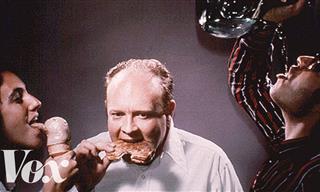
Once example of a study conducted in relation to the perception of time was held in 2005 at the Ludwig Maximilian University of Munich. Psychologists Marc Wittmann and Sara Lenhoff surveyed a sample of 499 participants, aged between 14 and 94. They were asked about how fast they felt time was moving, and had the option to select different answers ranging from “very slowly”, to “very fast”.
The psychologists conducting the study concluded that the perception of short periods of time, namely days, weeks or months, did not change with age. In fact, the general perception for these time periods was that the clocked ticked by quickly.

In contrast, when participants were asked about longer periods of time, such as a decade, a pattern began to emerge. Older people had a much greater tendency to perceive such time periods as moving faster.
The study’s participants aged 40 or older felt that time elapsed slowly in their childhood, but accelerated steadily from when they were in their teens into early adulthood.
The main reason for this is that a human being can estimate the length of an event from two distinct vantage points, prospective and retrospective. As their names suggest, the former occurs when an event is still ongoing, and the latter occurs when an event has ended.

A secondary reason for the perception of accelerated time is that our experience of time simply varies from one experience to the other. This means that there really is truth in the saying “time flies when you’re having fun”. The funny thing is that when we’re in such special moments, they seem to end quickly, however our perception of them when we look back at them makes it seem as if they were much longer than they really were.
It’s believed that the reason for the aforementioned is how the brain encodes new experiences. In other words, the more new memories we build on a weekend getaway, the longer the trip will seem in hindsight.
According to BBC columnist and psychologist Claudia Hammond, this is what’s known as the “holiday paradox”. From childhood through to early adulthood, we go through many new experiences and learn a whole myriad of new skills. As time goes by, our lives become more routine, thus we tend to experience less moments that are unfamiliar.

She contends that because we deal with so many new things in our early lives, this leads to over-representation of our early lives in our autobiographical memory. The inevitable result of this is that the time seems to have lasted longer.
All of these findings don’t mean that we are unable to slow time down in later life. In fact, we can do so by keeping our brains active, continually learning new skills and ideas, and exploring new places.
Content Source: Scientific American

Friendship Might Be One of the Secrets to Healthy Aging
A recent study finds that senior individuals with exceptionally good memory and cognitive function are the ones with strong relationships.
 3:17
3:17
Nothing Is What It Seems In This Uniquely Cool Museum...
New York’s Museum of Illusions offers a unique way of learning about perception and the human brain, though immersive and just really cool exhibitions.

Marijuana Might Not Be As Harmless As Previously Thought..
Marijuana is being pushed as a harmless recreational drug around the world, but it might not be as harmless as previously thought thanks to this study.
 54:17
54:17
Science Philosophy: What is the TRUE Nature of Time?
Join us as we journey through theories, discussions, and insights that challenge our perceptions and broaden our understanding of time itself.

Now I Understand Why Older People are Generally Happier...
Although many things go intro decline as we age, there's actually scientific evidence that older people are happier than their younger counterparts. Read on.

4 Ways to Tell Time Without a Watch
Phone battery died? These methods will help you tell the time by relying solely upon the sun - no watch needed!
 3:50
Viewed
3:50
Viewed
Do You Know What Alzheimer's Really Is?
This video will shed light on the different stages of this complex and incredibly destructive disease.
 9:34
9:34
Was Roman Concrete Really Superior to Our Own?
How did Ancient Romans make such durable concrete that it still lasts today?

These Engineering Failures Ended In Real Catastrophes
These are 10 of the worst engineering failures in history. These accidents had horrific results, and we must learn from them to never ever repeat them.

14 Times Nature Inspired Groundbreaking Technology
Let’s explore 14 remarkable examples of how nature has shaped modern technology.
 1:44
1:44
You Won't Believe What the Human Body Does in One Minute
How much do you think it is capable of doing in a single minute? Watch this video and you'll have your answer!
 15:41
15:41
Keep Your Home Safe with These Handy Gadgets
These 13 devices will transform your home security.

Travel From the Sun to Pluto With Our Interactive Guide!
The solar system is a fascinating place, and we wanted to bring you an interactive journey that you can use to travel through it. Enjoy the journey!
 15:07
15:07
Amazing New Scientific Discoveries You Missed in 2024
There have been so many interesting scientific discoveries this year that we have missed!

12 Steps That Help to Explain Einstein's Famous Theory
Have you ever wondered what Einstein's Theory of Relativity is all about? If you have, here is an easy-to-understand explanation!

Science Breakthrough: An Immunization Against Skin Cancer?
This scientific breakthrough offers hope for those who are struggling with skin cancer. You are now invited to discover more about this revolutionary vaccine.
 5:08
5:08
Erecting a Behemoth: Installation of an Offshore Oilrig
How do they install an offshore oilrig? This video will show you, step by step, how it is done.

The Facts You Didn't Know About the Human Body...
Discover 120 fascinating and surprising facts about your body you may not have known. Going over most of the body parts, you will learn so much you never knew about the body we all use.

10 New Things We've Learned About The Brain
We have learned some astonishing new things about the human brain in recent times.
 19:27
19:27
20 of the Most Infamous Tech Product Flops In History
Here's a look at some of the most infamous and biggest technology failures in recent history.
 15:34
15:34
This Stunning Video Visualizes the Size of the Universe
This video visualizes the number of galaxies in the world, giving you a look into the true size of our enormous universe.
 5:47
5:47
This Genius Child is a Better Calculator than a Computer
This ‘human calculator’ could likely outpace you entering the numbers into a calculator.

13 Astonishing Things You Never Thought You'd See
Here are 13 photos of rare phenomena you never thought you'd see!

8 Jaw-Dropping Black Hole Facts to Warp Your Mind
These black hole facts will bend your mind!

2023 in Science: Biggest Discoveries You Missed!
Let’s take a look at the most amazing scientific discoveries that made news this year.
 6:21
6:21
How to Make Cleansing Hydrogen Water from an Old Battery
Let's embark on this scientific journey to unlock the potential of water and discover the practical uses of hydrogen and oxygen in everyday life.

20 Fascinating Things That Can Be Found in the World
These pictures show us 20 fascinating and absolutely astounding things, from a single mountain with 1000 waterfalls to a giant ant!

These Wacky Inventions of the Past Appear Odd to Us Today!
These vintage tech inventions may look very interesting or even incredible, but their practicality today is questionable...

20 Useful Facts About the Science of Cooking
The science behind cooking is not often thought of, but it plays a crucial role in a dish turning out right. Here are 20 facts on the science of cooking.

6 Harmful Toxins You Didn’t Know You Encounter Daily
These toxic chemicals can be found in everyday products and can be extremely dangerous to us.
 5:06
5:06
The Only Manmade Object That Will Last Forever
This copper discus contains 116 images we launched into space for aliens to see
 10:04
10:04
11 Practical Technologies That Will Help Fight Flooding
These amazing innovations will be real handy during a flood.

The 12 Game-Changing Inventions From 2024 You Missed
2024 was a ground-breaking year in terms of innovation. Here's a look at some of the key breakthroughs from the year.

New Study: A Pill that Works Out Your Muscles?!?
New study shows that, though we are not there yet, a pill can and probably WILL come out that works out the muscles and grows them.

Study Says: With Age, Come Certain Cognitive Abilities
a study published in August 2021 in the journal *Nature Human Behavior reveals surprising findings that challenge this assumption and may be of great interest to all of us.

Could This Popular Ingredient Be a Cause of Cancer?
The chemical triclosan began to appear in a multitude of products in the early 1970s. This ingredient, found in a multitude of products has been linked to cancer.

The First Valentine's Day Was Not That Long Ago...
Let us take you on a fun history lesson with these 10 first-ever things that started way back in history and remain to this day.

When Under a Microscope, Even Ordinary Things Seem Alien
Have you ever given any thought to what every day things look like under a microscope? Some of these images are truly beautiful - see for yourself in the images below.

8 Fascinating Heartbeat Facts You Never Knew Before
These heartbeat facts will leave you astounded.

2024's Biggest Breakthroughs in Science We Must Celebrate
These recent scientific breakthroughs could change the world.
 4:52
4:52
Neon Lights: a Beautiful Union of Science and Art
Neon signs are a beautiful blend or artistry and science, and knowing the history and the science behind them make them even more exciting

Is Weekend Sleep as Good as Regular Sleep? Let's Check
If you thought sleeping in on the weekend was a bad habit, you're about to find out that it's quite the opposite.

10 Tech Products You Must Double-Check Before Buying
Beware! These tech products are most commonly faked.
 21:51
21:51
What Will the Universe Look Like in 10 Quintillion Years?
These questions take us beyond science into the realm of imagination, as we contemplate the ultimate fate of our Universe and everything within it.
 4:19
4:19
The First Robot Ever Made Was Created 250 Years Ago...
This automaton is pure genius, especially when you consider it was built 250 years ago...

16 Interesting Things We Bet You've Never Seen Before
Once we have finished school and learned all the necessary skills at work, it may seem that no further studying is necessary. 16 interesting photos you wish you had seen in textbooks at school.

12 Bizarre Scientific Facts You Never Learned at School
The scientific facts we collected in this list aren't the kind of stuff you'll see in a school curriculum.
To enable your Ad-Free Subscription, please fill the fields below
Your subscription was successful, now you can enjoy an ad-free experience!!
Note: To make sure you get no ads, please make sure to log in to your account. If you are logged in already, then refresh the page. The subscription can be cancelled at any time.


